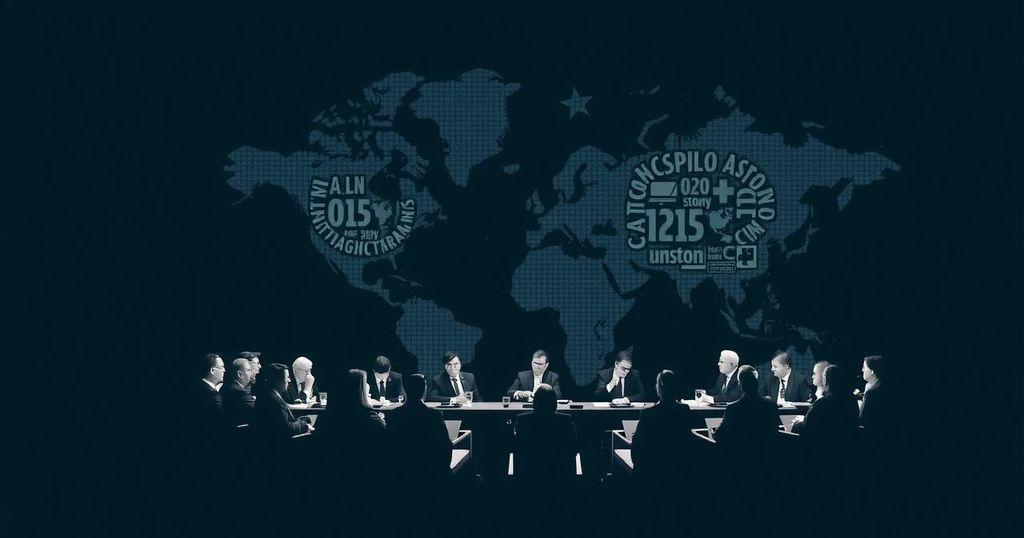Ignoring the Venezuelan Crisis: A Missed Opportunity at the U.N. General Assembly

During the opening of the United Nations General Assembly, Brazil’s President Lula and Colombia’s President Petro received backlash for their speeches condemning Israel while ignoring the humanitarian crisis in Venezuela. Both leaders failed to address Venezuela’s political turmoil, where approximately eight million people have fled due to Maduro’s oppressive regime. Their focus on distant issues raises questions about their commitment to regional stability, especially as both countries bear the brunt of the Venezuelan refugee crisis. Presidents Biden and Milei notably highlighted the Venezuelan situation, setting a contrast to their neglect, indicating a critical need for renewed efforts to restore democracy in Venezuela.
The recent addresses delivered by the presidents of Brazil and Colombia during the opening of the United Nations General Assembly have drawn severe criticism for their glaring omissions regarding significant humanitarian crises. In particular, both leaders voiced strong condemnation of Israel regarding the conflicts in Gaza and Lebanon, and expressed concern over the political turmoil in Sudan. However, they conspicuously failed to acknowledge the grave situation unfolding in Venezuela, a major crisis occurring in their own region. Neither President Luiz Inacio “Lula” da Silva of Brazil nor President Gustavo Petro of Colombia mentioned the autocratic regime of Nicolás Maduro, who is accused of rigging elections and perpetrating violence against peaceful protestors. Since Maduro assumed power in 2013, approximately eight million Venezuelans—over 20 percent of the nation’s population—have fled the country. In an irony compounded by their proposed international interventions, Lula and Petro ignored Venezuela while attempting to offer solutions to conflicts far removed from their national landscape. President Lula introduced a Brazilian and Chinese collaborative plan aimed at resolving the war between Russia and Ukraine, criticized for potentially legitimizing Russia’s territorial gains in Ukraine. Lula highlighted Palestinian interests in his speech while condemning Israel for its responses to sustained attacks from groups such as Hamas. President Petro’s address was similarly focused on Israel; he emphasized allegations of genocide in Gaza without acknowledging the provocation from Hamas that has historically targeted Israeli civilians. Critics have pointed out that Petró’s lengthy commentary on the Israel-Hamas conflict seemed to overshadow broader humanitarian issues closer to home. In contrast, U.S. President Joe Biden managed to address the Venezuelan crisis in his speech, underlining the universal longing for rights and freedom exhibited by Venezuelans despite Maduro’s electoral fraud. President of Argentina, Javier Milei, also criticized Maduro’s regime while addressing the United Nations, highlighting the hypocrisy of allowing Cuban and Venezuelan dictatorships a platform on the Human Rights Council. Furthermore, Guatemala’s President Bernardo Arévalo condemned the suppression of freedoms in both Venezuela and Nicaragua. The ongoing Venezuelan exodus profoundly impacts Colombia and Brazil, with reports indicating that over 2.4 million Venezuelans have sought refuge in Colombia and more than 500,000 in Brazil. The leaders’ neglect of this pressing humanitarian issue is particularly disconcerting, especially as experts predict that potentially millions more may flee if democracy is not restored. Asylum requests in Brazil have surged since Maduro’s recent electoral malfeasance, according to UN officials. Rather than engaging in distant geopolitical disputes, it would be prudent for Lula and Petro to prioritize efforts aimed at reinstating democracy in Venezuela, thus addressing what is recognized as the largest humanitarian disaster in Latin America in recent times, directly affecting their nations. Thus, it is imperative for regional leaders to confront the Venezuelan crisis with the urgency and focus it warrants, particularly as it engulfs their own countries.
The speeches delivered at the United Nations General Assembly serve as a critical platform for world leaders to address pressing global issues. However, this year, the speeches by Brazilian President Luiz Inacio Lula da Silva and Colombian President Gustavo Petro have been criticized for their glaring omission of the Venezuelan humanitarian crisis, despite its immense repercussions on both Brazil and Colombia. The exodus of Venezuelans escaping the oppressive regime of Nicolás Maduro has become one of the most significant refugee crises worldwide, affecting neighboring countries directly. With over 8 million Venezuelans displaced and severe human rights violations documented, the lack of acknowledgment from these leaders highlights a concerning tendency to prioritize international conflicts over urgent regional needs. As both Brazil and Colombia grapple with the influx of Venezuelan migrants, their failure to directly address Venezuela in their addresses at the UN raises questions about their commitment to regional stability and humanitarian response.
In conclusion, the absence of any mention of the Venezuela crisis by Brazil and Colombia’s leaders during their speeches to the United Nations underscores a significant oversight, particularly in light of the profound humanitarian ramifications for their nations. Their focus on distant conflicts while neglecting the ongoing tragedy at their doorstep is not only troubling but also diminishes their credibility as regional leaders. The international community’s awareness, exemplified by the comments of leaders like President Biden and President Milei, shows the pressing need for concerted efforts to restore democracy in Venezuela. The resounding call for action and acknowledgment of the Venezuelan crisis must take precedence over political posturing on far-off issues, as the humanitarian situation unfolds in real-time nearby.
Original Source: www.miamiherald.com







